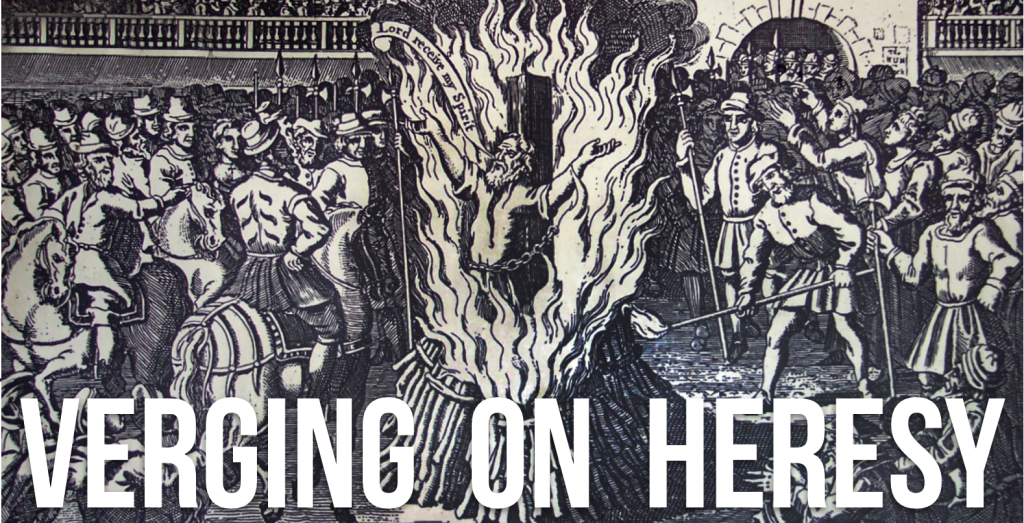This is the first in a new kind of post I’m going to be writing for the blog. Actually, it’s more of an introduction to a new kind of post I’ll be writing. It is to do with heresy.
(Also, sorry it’s been ages since I’ve blogged. I’ve taken a little break, but I’m back!)

I hope it goes without saying that any discussion of heresy here will not ever lead me to consider the way ‘heretics’ have been dealt with in the past (see above picture) as ok.
Why heresy is bad
What is heresy, then? One dictionary definition describes it like this:
“a belief or opinion that does not agree with the official belief or opinion of a particular religion” (Merriam-Webster Dictionary)
In other words, it’s believing things that are considered incorrect. Of course the institution can be wrong, the ‘official belief or opinion of a particular religion’ can be off the mark, but for my definition of heresy I’m talking about actually being wrong, believing something which isn’t true, which God Himself disagrees with.
I’m not particularly interested in heresy. I am, though, interested in theology. And when theology goes wrong we end up with heresy. Theology matters. It matters because God matters, and thinking and speaking about God therefore matters very very much.
I’m not going to spend ages defending theology and talking about why it’s so important. What I will do is point you to something I’ve written as part of my role as a pastor at Gold Hill for our discipleship website (which I don’t shamelessly plug all the time on this blog but which you should totally check out!). I wrote a post called where I spend a bit more time exploring why theology matters so much.
But for now I’m going to assume it does, that it’s important to have our thinking about (and therefore relating to) God in order.
And if theology is important, heresy must be bad.
Verging on Heresy
So I think what we believe, our theology, is really really important. But there’s another thing I’m increasingly keen that we get right, which is how we come to work out what we believe. The processes we use to determine truth reveal an awful lot about us, and I want to make sure I’m doing theology well, instead of just having good theology. In a maths exam, getting the right result isn’t always enough. If our working isn’t ok, then we won’t get all the marks.
I might cross the finishing line in a race like everyone else does, but if I’ve got to that finishing line by walking for a little, stopping for a beer and then hopping in a taxi to catch up then I’m not good at running. No matter what time I get when I cross the line, I’m not a good runner.
I want to make sure the ways I think about God are right, just as much as I want what I think about God to be right.
It might be that the end-product of my theology is good and sound, that my doctrine is right. But if the processes we use to get there isn’t up to scratch, there is a problem that needs to be addressed.
It’s not full on heresy. But it’s verging on heresy.
Every so often I notice things in the way that I am thinking or the way that I hear myself or others talking (things we often say) which maybe reveal an approach to thinking about God which is not great. I may not always be right, and maybe as I do this I’ll be verging on heresy myself, but that’s the accountability that comes from a blog being public. But I’m going to explore some of those things that concern me, in the hope that I—and others—can become sturdier in the way we do theology.
Ultimately, that’ll make our theology itself far more worth building a life on.

Pingback: Verging on Heresy – "It's a justice issue" - Limping into Truth()